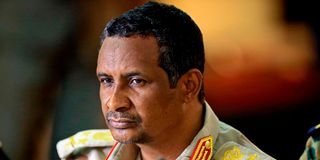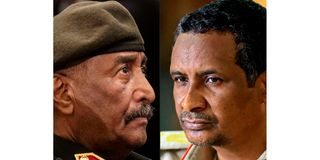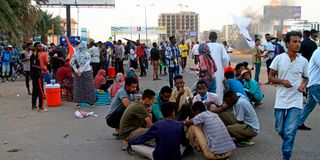Prime
Sudan clashes: Hemedti plucks page from Omar al-Bashir ouster book

In this file photo taken on June 8, 2022 Sudan's paramilitary Rapid Support Forces commander, General Mohamed Hamdan Dagalo (Hemedti), now de facto deputy military leader, attending a meeting in Khartoum.
What you need to know:
- So far, Igad, the African Union and leaders from the region are urging the parties to lay down the arms and negotiate “pertinent issues,” according to a statement from the South Sudanese Ministry of Foreign Affairs and International Cooperation.
- What may worry any leaders in the region is how this clash quickly exposed the broken relationship between the head of the Sovereignty Council Abdel Fattah al-Burhan and his deputy Mohamed Hamdan Dagalo alias Hemedti who heads the RSF.
The Intergovernmental Authority on Development (Igad), a regional bloc, was on Saturday rushing to prevent another collapse of Sudan, after the army clashed with paramilitary forces in a supremacy battle.
Igad, the African Union and leaders from the region were urging the parties to lay down the arms and negotiate “pertinent issues,” according to a statement from the South Sudanese Ministry of Foreign Affairs and International Cooperation.
Yet both sides were claiming victory. The paramilitary forces known as the Rapid Support Forces (RSF) issued a series of media statements in which they claimed control of Khartoum’s main airport, the Republican Palace and state guest houses 02 and 03 and the arrest of some senior commanders of the military.
They also said they was controlling Meroe airport as well as military camps in El Fasher, including the Signal Corps, the Medical Corps, and El Fasher Airport.
What may worry leaders in the region is how this clash quickly exposed the broken relationship between the head of the Sovereignty Council, Abdel Fattah al-Burhan, and his deputy Mohamed Hamdan Dagalo, alias Hemedti who heads the RSF.
In an interview with Aljazeera Arabic, Hemedti said he will hunt down his boss for launching a “war on us".
“We did not attack anyone, and our fighting was a response to our siege and assault,” Hemdti said. “We will continue to pursue al-Burhan and hand him over to justice. I send a message to the honourable members of the armed forces to join the people's choice, and we represent that the battle will be decided in the coming days."
Earlier, the RSF issued a statement claiming self-defence.
“What the Armed Forces Command and a number of officers did was represent a clear violation of our forces, which were committed to peace and restraint. We point out that the behavior of the Armed Forces leadership confirms the lack of desire for the stability and security of the homeland However, the honorable sons of the armed forces joined the people’s choice.”
A source at the General Command headquatres of the Sudanese Army rejected claims of control by RSF. He also refuted allegations the RSF had taken control of the presidential palace where al-Burhan resides.
“The army controls all military bases and airports in the country,” the official told The EastAfrican.
RSF has since posted videos of its fighters celebrating in the airport airside. Some airlines immediately suspended flights, with Saudi Arabia indicating one of its aircraft had been involved in an “accident” at the airport, forcing it to suspend operations.

Sudan's Army chief Abdel Fattah al-Burhan (L) in Khartoum on December 5, 2022, and Sudan's paramilitary Rapid Support Forces commander, General Mohamed Hamdan Dagalo (Hemedti), in Khartoum on June 8, 2022.
Hemedti pro-civilian?
If Hemedti engineers a coup, however, it could be a strategy he learnt from the April 2019 ouster of Omar al-Bashir. It is no wonder that Burhan accuses Bashir’s remnants of planting animosity between the two arms of security forces, a fightback from being removed from power and influence.
The writing had been on the wall, as we reported last month. Hemedti first changed tack, or heart, when he publicly lampooned the junta he serves in for delaying civilian transition.
A transitional government was ousted on October 25, 2021 after al-Burhan accused it of spending energy on wrangling, rather than planning a full transition to civilian-led government. It turned out the junta was self-preserving. There has not been a successful attempt to form a new government.
Hemedti, on March 7, called for the immediate implementation of the Political Framework Agreement, which is supposed to return the country to democracy, and a handover of power to civilians. He vowed to “resist” anyone clinging to power.
But is he pro-civilian? The RSF itself is an offshoot of the Janjaweed, a notorious militia nicknamed ‘devils on the horsebacks’ for its role in crushing rebellion in Darfur. That violence earned an indictment for Bashir at the International Criminal Court. The junta has never surrendered him.
The RSF today is supposed to guard borders and provide security in volatile regions. Its leader, Hemedti, enjoys strong Russian ties, as shown in his travels to Moscow recently.
On Thursday, RSF deployed across the cities, which the army said was a violation of security procedures.
Other details: What caused Sudan military clashes?
Nonetheless, Hemedti thinks the 2021 coup was a mistake.
“We said, with all our will, that power be handed over to a fully fledged civilian government,” he said at a military base in Karari, north of Khartoum, last month.
Gen Dagalo said his RSF has no dispute with the army, but rather with those who want to cling to power.

Sudanese protesters gather for a collective Iftar fast-breaking meal during the Muslim holy fasting month of Ramadan as they protest against the army and paramilitaries in southern Khartoum on April 6, 2023.
'No two armies'
The Forces of Freedom and Change (FFC) — which led the protests that ousted former president Bashir in 2019 — was forced to come out and clarify it was not siding with Gen Dagalo and his RSF.
The clashes are a further show that the transition document which had been scheduled for signing earlier this month before this was postponed, may never be signed, with the junta now splintered.
The FFC said last week there had been disagreements between the Sudanese army and the RSF over command and control of the integrated forces.
“While negotiations between the military have made progress in several areas, an agreement on the latter issue still needs to be finalised,” said the FFC in a statement.
The joint military-technical committees had tried to talk over the cracks in integrating the RSF into the Sudan Armed Forces (SAF) and the unification of command and units, without success.
But power was always the bump. Brig Gen Nabil Abdallah, spokesman of the SAF, suggested RSF had declined integration and being subordinate to the army.
“We cannot have two armies in the country,” Gen Abdallah said.
The RSF, with an estimated 40,000 to 70,000 members, was established in 2013 by the Sudanese government. The group was originally formed to combat rebels in the western region of Darfur, but has since been involved in various conflicts throughout the country.
Whether Hemedti is his own man or an incarnation of Bashir’s regime remains to be seen, but he seems to be using an old strategy. In 2019, the military took advantage of civilian displeasure with Bashir to oust him, and took over as a new leadership.
Is Hemedti taking advantage of civilian displeasure with the junta to cement his role? It looks likely.
Civilian movements have distanced themselves from an evil alliance.
Khalid Omer, the official spokesman for the civilian forces in the political process, issued a statement denying claims that there is an alliance between the RSF commander and FFC leaders, with the aim of pushing for the speedy return to civilian rule.
According to Mahjoub Hussein, the director of the National Center for Citizenship, Sudan needs a new professional military that works according to the law, is neutral and does not engage in politics.
The RSF has been charged with a number of human rights offences, including torture, extrajudicial executions, and using rape as a weapon of war.
The group has also been charged with evicting civilians against their will and pillaging their possessions. A significant part of the 2019 Sudanese crackdown on pro-democracy protesters, that left dozens of people dead, was played by the RSF.
While the RSF worries that al-Burhan will discard the contested elements once they are integrated, he appears to believe military discipline can allow controlling the elements that were recruited on ideological bases during the former regime.
Reporting by Aggrey Mutambo, Mawahib Abdallatif and Fred Oluoch





